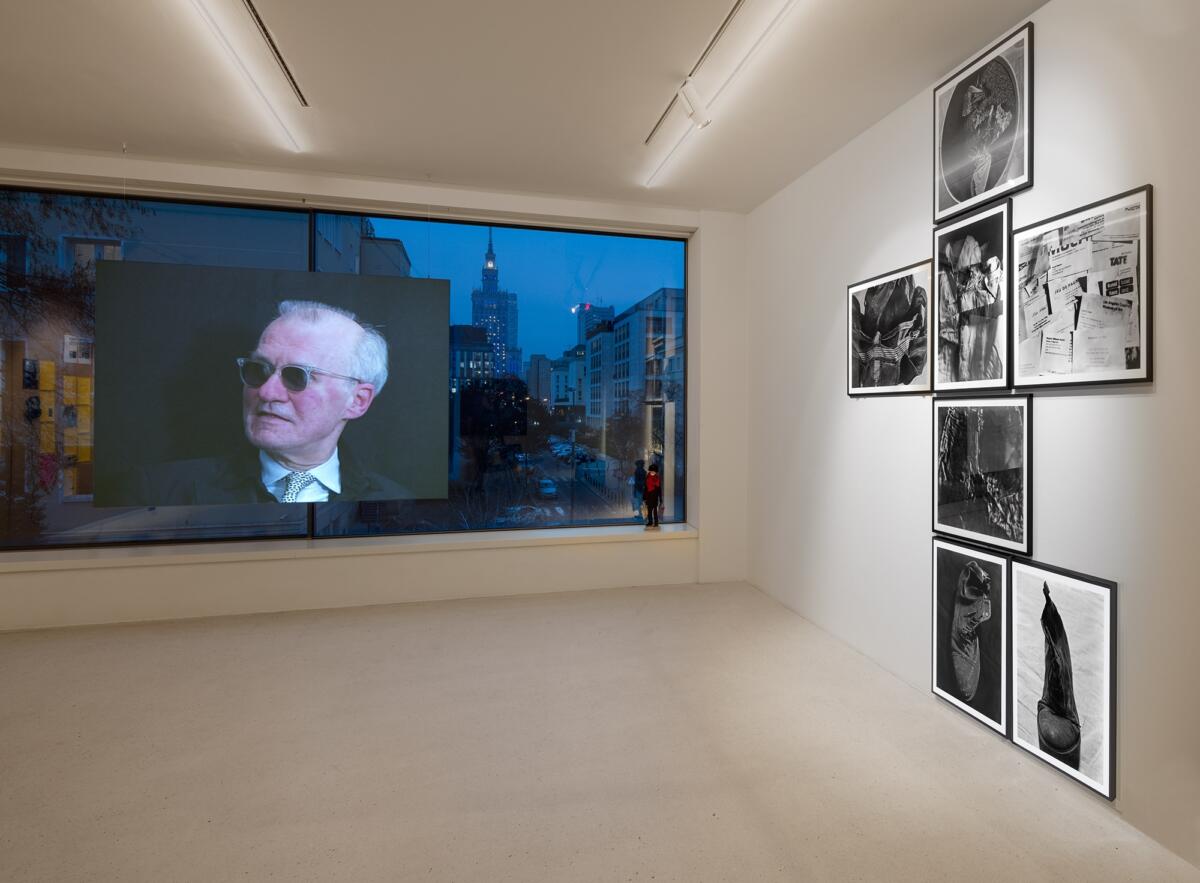
Barry Schwabsky
The Perpetual Guest: On Warren Niesluchowski
I don’t remember exactly when I met Warren, or how. It feels like I’ve always known him, which is as it should be, because the essence of his temperament is being known, and knowing others. Both pleasure and necessity have prompted him to develop a preternatural skill at networking.
It makes sense that everyone in the art world knows Warren, but how is it that his circle of acquaintance seems so much wider than that? In his case it’s as if the six degrees of separation that, according to urban folklore, connect us with all humanity have been reduced to no more than two. I remember once, years ago, being with him at an opening in Philadelphia. He had so many goodbyes to say at the end of the evening that we missed the chartered bus back to New York City. There wasn’t another train until four in the morning, so off we went looking for the bus station. As we wandered the unfamiliar streets in search of it, we happened to pass a station for the local commuter trains, and at that moment a woman stepped out and began to ask us for directions. Just as I was going to explain that we were strangers there ourselves and couldn’t help her, she turned to my friend and exclaimed, “Warren! Is that you? What are you doing here?” Wherever he goes, it seems, random people—faces in the crowd, passers in the night—recognize Warren.
But not only random people. Later, when I was living in London, Warren would visit periodically. Upon his arrival I would ask him if he had any plans for dinner, and he would usually say something like, “Ah, I might be meeting Nicholas” (Warren is on a strictly first-name-only basis with everyone he knows). “I’ll have to call him first and find out what’s going on.” It was up to me to divine whether the Nicholas to whom he was referring was Nicholas Serota, director of the Tate, or Nicholas Logsdail, proprietor of the Lisson Gallery, London’s most distinguished commercial gallery. Sometimes geography gives the clue. In London the Marina he speaks of will be the writer Marina Warner, but in New York he must mean Marina Abramovic. (That Philadelphia opening was hers.) At least when he mentions Anish or Vito I can tell he’s talking about Kapoor and Acconci.
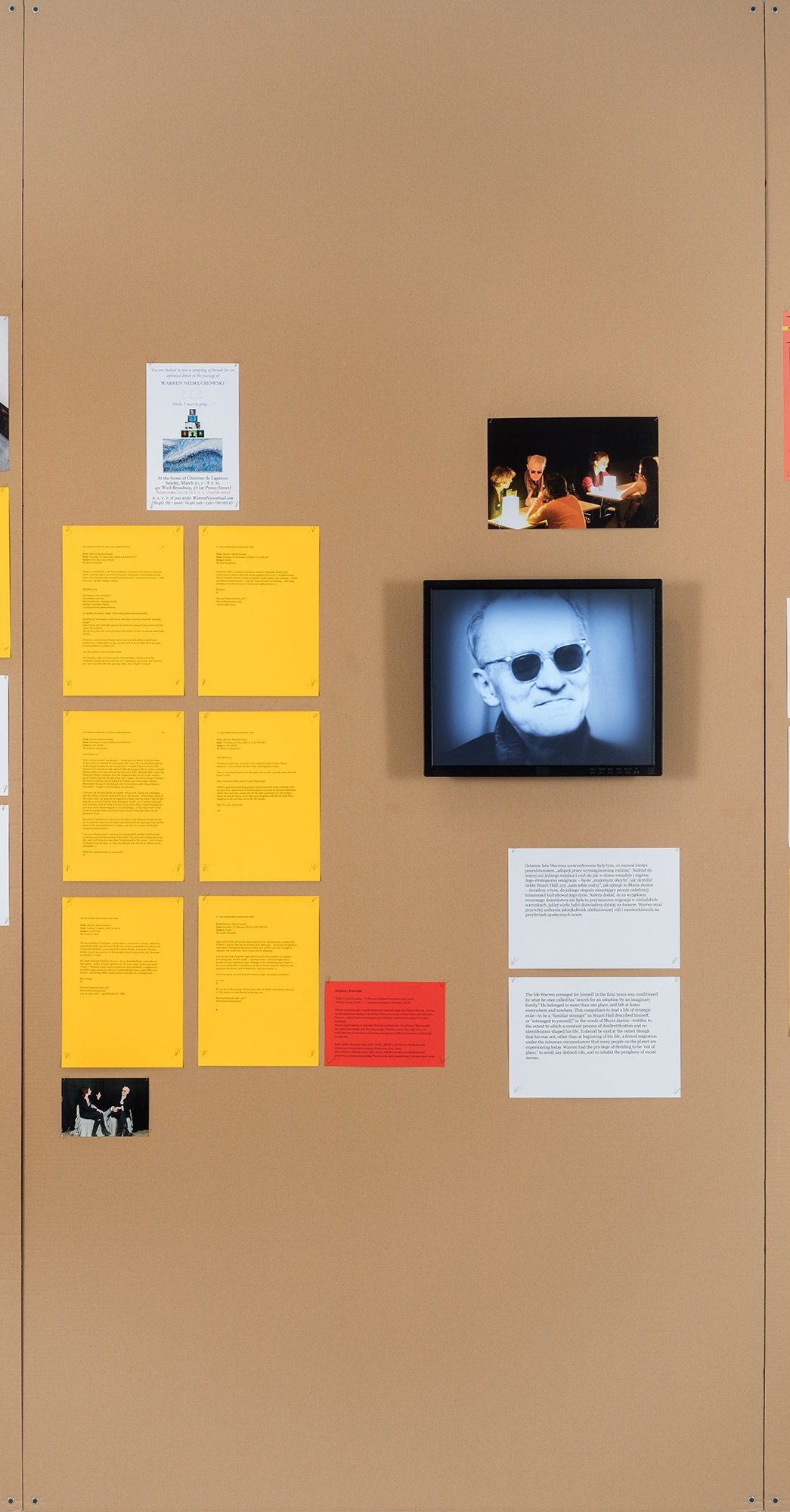
‘And Warren Niesłuchowski Was There: Guest, Host, Ghost’, exhibition view at Foksal Gallery Foundation, 4.12.2020-16.01.2021 Warsaw
Being on a first-name basis with Warren may owe something to the difficulty people have pronouncing his surname, Niesluchowski. But although everyone knows him, and knows him as Warren, no one knows what he does. Mostly, he seems to drift through Europe and North America, turning up, Zelig-like, wherever something interesting is happening. He always travels by the cheapest means possible; what the bus ride from Warsaw to London is like I can’t say, but it doesn’t sound comfortable. Warren knows it well. Likewise, he is always turned out with incredible elegance in thrift-shop finds. Even his socks are snazzy. He’s welcome worldwide. No great event is complete without his presence. But he has no concrete role. He is not an artist, a critic or a curator, let alone a collector or dealer. Occasionally he accepts a commission as a translator, and these gigs seem to help him get by. He often mentions a “project” on which he is engaged with this or that artist, but it is usually hard to ascertain its nature, or what his role in it might be. He is, to all appearances, a lily of the valley; he neither sows nor reaps.
Warren leads what is in many ways an enviable life, but there is a not inconsiderable drawback. He is, essentially, homeless. And to some extent, his condition seems fated: Warren was born adrift. He came into the world in a displaced persons camp in Germany after World War II, his Polish parents having met in a forced-labor camp in that country, and grew up near Boston (where a strict Catholic education laid the groundwork for his considerable erudition); he lived abroad after becoming an Army deserter in 1968 and returned to the United States in 1975, where he belatedly found himself a Harvard undergraduate. He stayed there as long as he could without taking a degree. But over the past decade or so, having discovered in himself some inner need for drift that had gone ungratified, he has made his home wherever someone will put him up. Warren is a perpetual guest. His base, to the extent that he has one, is in Warsaw, where he has a sister, but mostly he lives where anyone from his extended network happens to have a spare bedroom or a temporarily empty apartment where he can stay for a while. I once told him that he could solve his financial problems by writing a bestselling book based on his experience; it could be called How to Make Yourself Welcome. He hasn’t written it yet, unfortunately. And now that he’s in his mid-60s, and not as physically sturdy as he once was, I think he’s been brooding a lot on the future his nomadic lifestyle has in store for him, when he becomes less able to move around as easily as he does now.
Living without a permanent home means living with no more possessions than can be packed in a suitcase. Yet, like most of us, Warren accumulates things—and some of them, like books, are too heavy to lug around. He has therefore come up with an original method for accumulating things without being weighed down by them—he leaves things behind at every place he stays, giving his things a stability he denies himself. (Warren: if you’re reading this, that brown suitcase you left in my apartment has not come to New York City with me, but it’s stored in the basement in London. If we’re ever both there again at the same time, it can be retrieved.) “A cynicshould really have no possessions whatever: for a man’s possessions, in a certain sense, actually possess him,” wrote Friedrich Schlegel in one of his Athenaeum Fragments, referring to the ancient philosophers who, a bit like Warren, made themselves homeless. To Schlegel’s aperçu his friend Friedrich Schleiermacher added a caveat: “The solution to this problem is to own possessions as if one did own them. But it’s even more artistic and cynical not to own possessions as if one owned them.” Warren has at times practiced both of these solutions to the problem of ownership.
It wasn’t always thus. When I first knew Warren he had a very respectable job. He was working at PS1, the pioneering exhibition space in Queens that was later acquired by MoMA. I don’t remember how long that lasted, but after he left PS1 he was a freelance editor for Routledge, and he earned enough money to hold down a small apartment on the Lower East Side. Then, all of a sudden, he wasn’t doing the editing job and didn’t have the apartment anymore. He had gone into circulation.
***
One of the mysterious projects that Warren had been mentioning for a long time involved the Hong Kong–born, Los Angeles–based artist Simon Leung. As usual, I never quite understood what it was all about, but one day Warren mentioned in passing that Simon might be getting in touch with me about contributing to the project. Sure, whatever. While admiring the paintings in the Prado one day I got a call—it was Simon. He was making a video about Warren. Would I be willing to lend my voice to it? Of course, if only out of curiosity. Simon (whom I had never met, and whose work I was nearly as little acquainted with) would be passing through London soon, and we made an appointment.
I imagined he would be interviewing me—asking me some questions about Warren, my impressions of him, our relationship. Not at all, as it turned out. Instead, he had a text he wanted me to read, an excerpt from Immanuel Kant’s essay “Perpetual Peace,” a work I’d heard of but never read. Leung explained to me that he had found a couple of passages in it that conveyed his understanding of our mutual friend, and that he was asking some of the people who had extended hospitality to Warren over the years to read one or another of them for the soundtrack of his video.
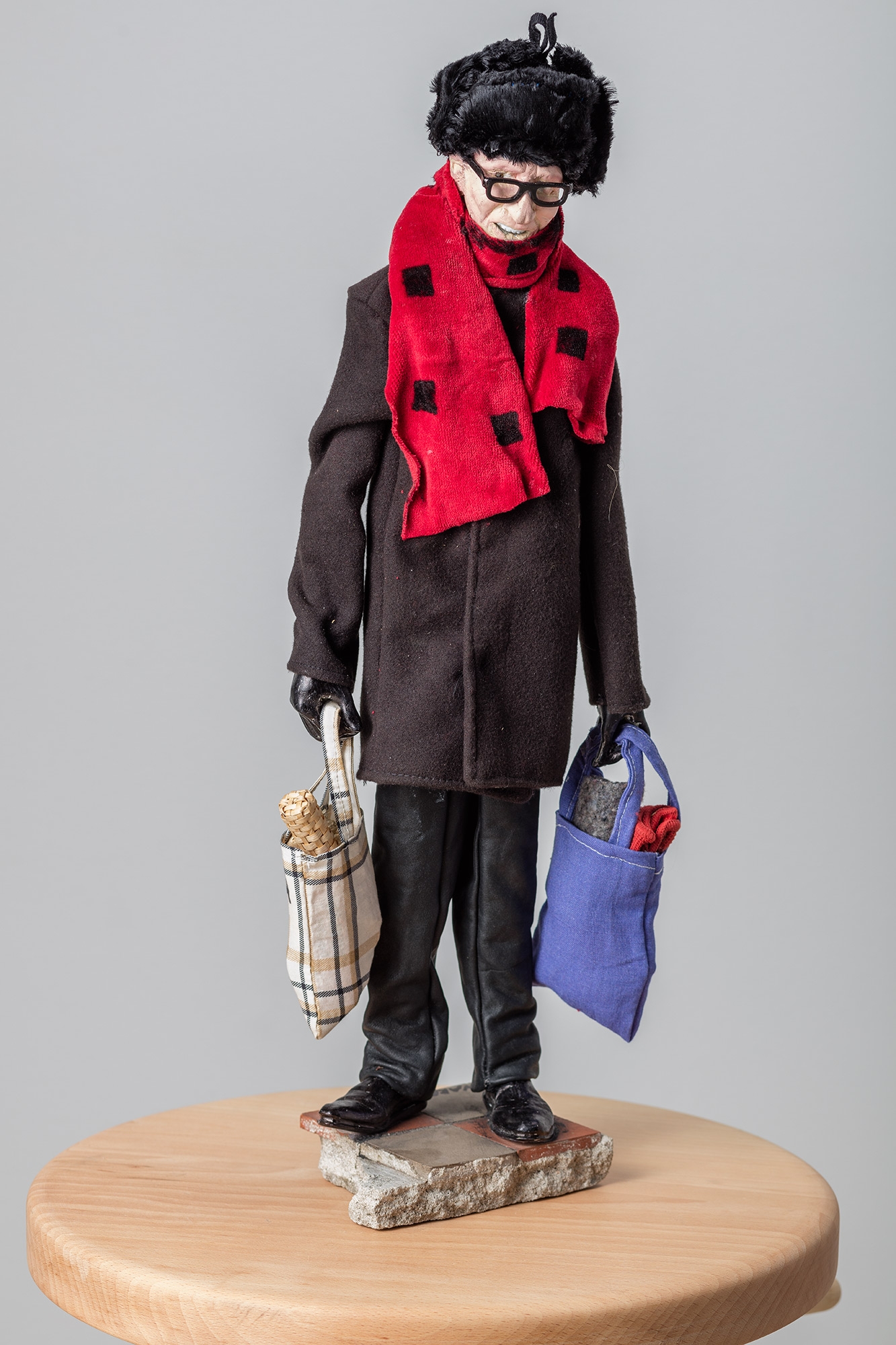
Paweł Althamer, ‘Warren’, 2020, courtesy of Foksal Gallery Foundation
The passage he handed me was astonishing—not just brilliantly reasoned, as I’d expected, but laced with a sardonic wisdom. Its subject: hospitality as a political notion. The basis of world citizenship is “the right of a stranger not to be treated as an enemy when he arrives in the land of another.” It is the right not to be a long-term guest but a peaceful visitor, a right derived not only from the fact that originally no individual had any more claim to a spot on the earth’s surface than any other, but also from the finitude of that earth, which means that we “cannot infinitely disperse” and therefore “must finally tolerate the presence of each other.” With regard to Warren and his peculiar modus vivendi, Simon’s choice of text seemed apt. In a sense, Warren is always testing his hosts’ capacity for hospitality. How long can a passing visit be extended before it becomes—before it threatens to become—something more like cohabitation? What are the limits to one’s hospitality, one’s toleration? You don’t just take Warren in; you take him on. He becomes like a temporary (or maybe not so temporary) member of the family—and relations are always a bit more fraught within the family than among mere acquaintances. The limits need to be negotiated and renegotiated; all of Warren’s hosts are tacitly aware of this, but no one is so sensitive to the situation as Warren. He sometimes alludes to the diplomacy that his mode of living requires, and points out that his friends are diplomatic toward him too, such as when refraining from asking potentially embarrassing questions. “They don’t say, ‘Well, why are you calling me…. Where would you be if I wasn’t at home to take this call?’” Hospitality doesn’t work like that. “It’s either possible or it’s not, but it’s given on a gift basis.”
Leung has been thinking about these issues for a long time, probably longer than I have. He and Warren met in 1992 when Leung was an artist in residence at PS1. While there he made a video installation with the wonderfully Tolstoyan title Warren Piece (in the’70s). I never saw that work, which involved displays of documents and ephemera as well as three videos shown on monitors, but I gather it focused on Warren’s experience as a Vietnam-era deserter who ended up in Paris working with the Bread and Puppet Theater. This was the period, I believe, when Warren became Warren—not his given name but the one on the false passport he’d come by at the time. Bits from that work turn up nested within Leung’s new piece about Warren, War After War. I saw it, a year and a half after making my little spoken contribution to it, last spring at the CUE Art Foundation in New York. It has more recently been screened at the MAK Center (better known as the Schindler House) in Los Angeles as part of the exhibition “91 92 93,” a three-person show featuring Andrea Fraser, Lincoln Tobier and Leung, and is now being screened at the Centre for Contemporary Art Ujazdowski Castle in Warsaw in a show called “Regress-Progress.” That exhibition is on view through January 15, but because the principle of the exhibition is that it changes during its run, War After War will be shown only through October.
As the feature-length video begins, we see Warren pulling his carry-on-sized rolling suitcase up to a house—not the Schindler House, as I first guessed it would be, and where Warren was granted a residency last January in order to assist his collaboration on Leung’s piece, but a modern suburban house set in a leafy landscape that looks more East Coast than West Coast. He approaches the building in a quizzical way, as if the very notion of a house, or of a home, was slightly unfamiliar—like a word in a foreign language one had learned but had not used in a long time. The camera moves indoors, and it turns out that the house contains a vast library. Then, in a series of brief sequences, we see Warren in a variety of situations: for a while he’s at a house party, where he seems an isolated, pensive figure (later he will be seen at other parties, and art openings, in a different guise, the loquacious bon vivant); then he’s visiting a multimedia museum exhibition about the Vietnam War (with Jimi Hendrix playing “The Star-Spangled Banner” on the soundtrack). Warren wanders through these early scenes as a silent witness and seeker, a sort of revenant (the coat draped over his shoulders like a cape recalls, at times, the costume often worn onscreen by that other haunting Eastern European figure, Bela Lugosi). There is sometimes a voiceover, but the voice is not Warren’s, and the text—the excerpts from “Perpetual Peace”—has no overt connection to what we (and Warren) are seeing. Finally, after a long few minutes of this mute spectatorship, Warren makes his voice heard. Standing inside the house looking out, he intones a solemn song in a foreign language—as I later learned, a somewhat garbled version of the once-famous Chinese revolutionary anthem “The East Is Red.” (Old revolutionary songs are a recurrent feature of War After War. We also hear Warren sing the Internationale and, as he examines some dead flies through a magnifying glass, “Bandiera Rossa.”)
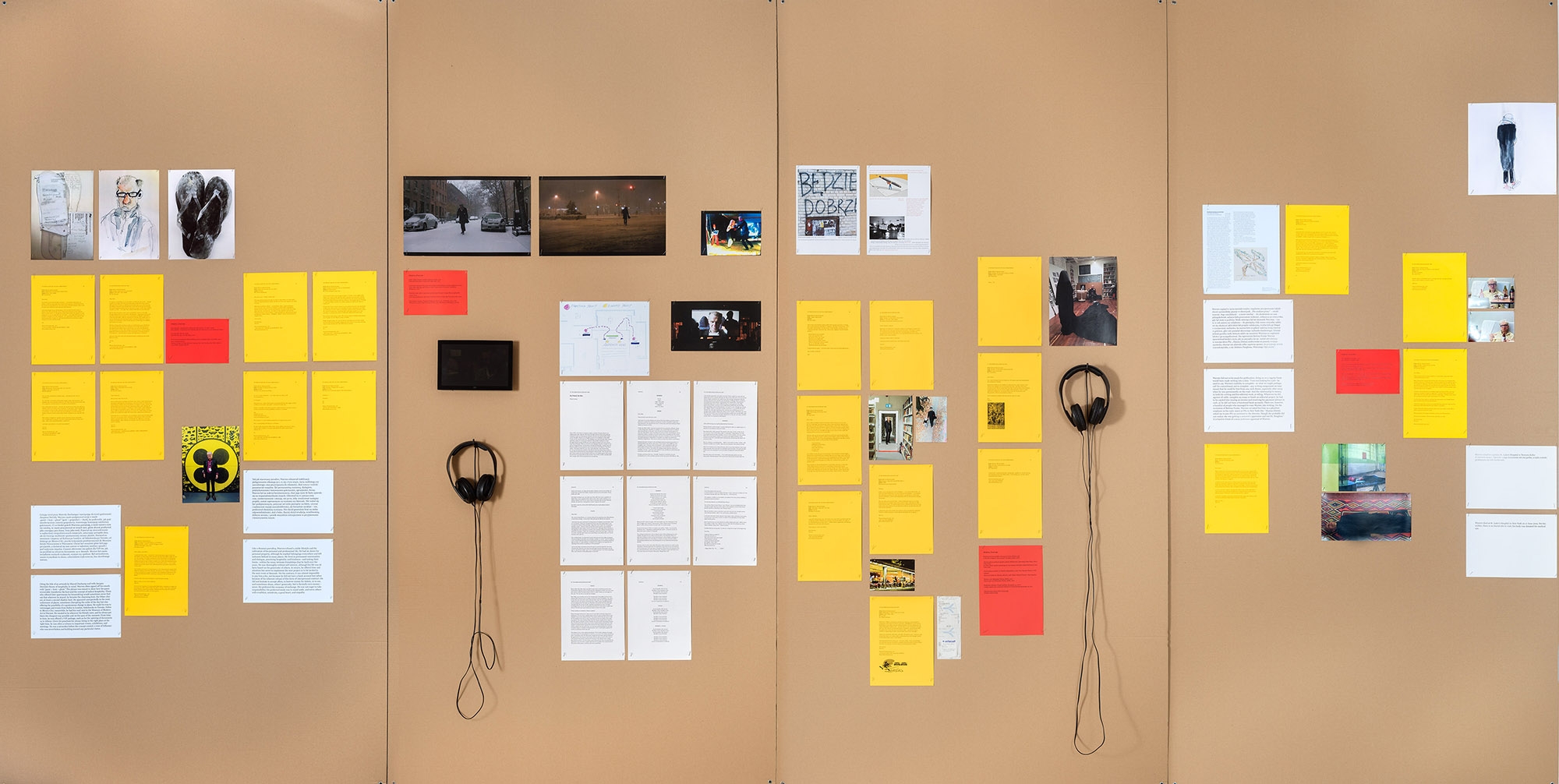
‘And Warren Niesłuchowski Was There: Guest, Host, Ghost’, exhibition view at Foksal Gallery Foundation, 4.12.2020-16.01.2021 Warsaw
Soon enough, Warren’s speaking voice is heard. Much of the video consists of straightforward interviews with him, presented talking-head style or used as voiceover with counterpointed visuals. He is not only a witness but one who ruminates over what he has seen. For instance, we see him on the floor doing exercises on a beautiful geometrical rug; like many of us, he is working to cultivate his vital energies, but the sequences of movements ends with a long period of stillness, his eyes closed, arms stretched out, and suddenly we realize that he is not only preparing for life but for death—just as he had said on the voiceover a few moments before. When we encounter him later in a hospital bed he looks terribly thin, though still natty, sporting a beret along with his hospital gown. There’s vague talk of heart problems. In other sequences we see Warren walking down a street of modest brick row houses somewhere in London—he buzzes a door and begins to engage the unseen person inside in a conversation about a set of keys he’s trying to hunt down. And there he is tramping through snow-covered New York streets to meet Milo, the cat he must look after while apartment-sitting; its owner compliments him on his tie—“So chic!”—and he responds that a tie is “the perfect Kantian item, something that has no use at all but gives great Sinn und Sinnlichkeit.” His segue from Kant’s aesthetics to the German rendering of the title of Jane Austen’s first published novel is clever, but there’s a ruefulness behind it. Is he also thinking of his own “useless” (that is, nonproductive) existence, and the hope, which would certainly be affirmed by those who know him, that he contributes to the lives of others in his own way, which might well be summed up in Austen’s notion of “sense and sensibility”? What Warren would not ever say, I think, though it is an idea that his invocation of Kant could justify, is that he is therefore a kind of artist—or even that his life is art.
***
I couldn’t help being touched by Leung’s portrait of my friend. He and I view Warren a little differently, though. For Leung, the Vietnam era is the time that has most strongly marked the course of Warren’s life; to my mind, World War II and its aftermath dominate the story. But thematically, the portrait is very rich. Although not all its themes are developed as thoroughly as they might have been, their multiplicity, and Leung’s skill at creating a reflexive structure that allows him to move fluidly among them, is testimony to a life lived, though in the shadow of two wars, with originality and verve. Leung calls Warren a “cosmopolitan nomad,” but Warren wonders which one he really is: a cosmopolitan or a nomad—that is, by his own definitions, one who is at home everywhere or one who is at home nowhere?
For me, and I think for Leung too, Warren is a romantic figure. Yet one of the attractive things about Warren is that he never romanticizes himself. At one point in War After War, the famous lines from “The Love Song of J. Alfred Prufrock” are heard, and their relevance is patent: “No! I am not Prince Hamlet, nor was meant to be;/Am an attendant lord, one that will do/To swell a progress, start a scene or two,/Advise the prince”—though Warren is never, as Prufrock thought himself, “Almost, at times, the Fool.” In another era Warren really could have been an excellent courtier, “full of high sentence,” and how curious it is that our society doesn’t easily accommodate people with undefined roles. And yet we need such people, to add Sinn und Sinnlichkeit to life rather than to produce. I suppose that’s why I’ve never questioned my impulse to offer my home to Warren when I could—on account of a sympathy that blossomed into friendship, yes, but also because of an obscure sense of principle. I think there should be space for those who neither sow nor reap but through their example show us something about how to live our life as art. In War After War there’s a funny detail that Leung’s camera homes in on more than once: the many extra buttons scattered on a sleeve of Warren’s coat. I’ve noticed them before, but only after seeing the sleeve onscreen did it occur to me to wonder whether it was the work of some fabulous deconstructive designer, a Margiela or Yamamoto, that Warren has lucked upon in one of his thrift shop trawls, or just his way of keeping replacement buttons on hand so that his coat will stand him in good stead no matter what happens.
Style or necessity? Art, and Warren, remind me they can be one and the same.
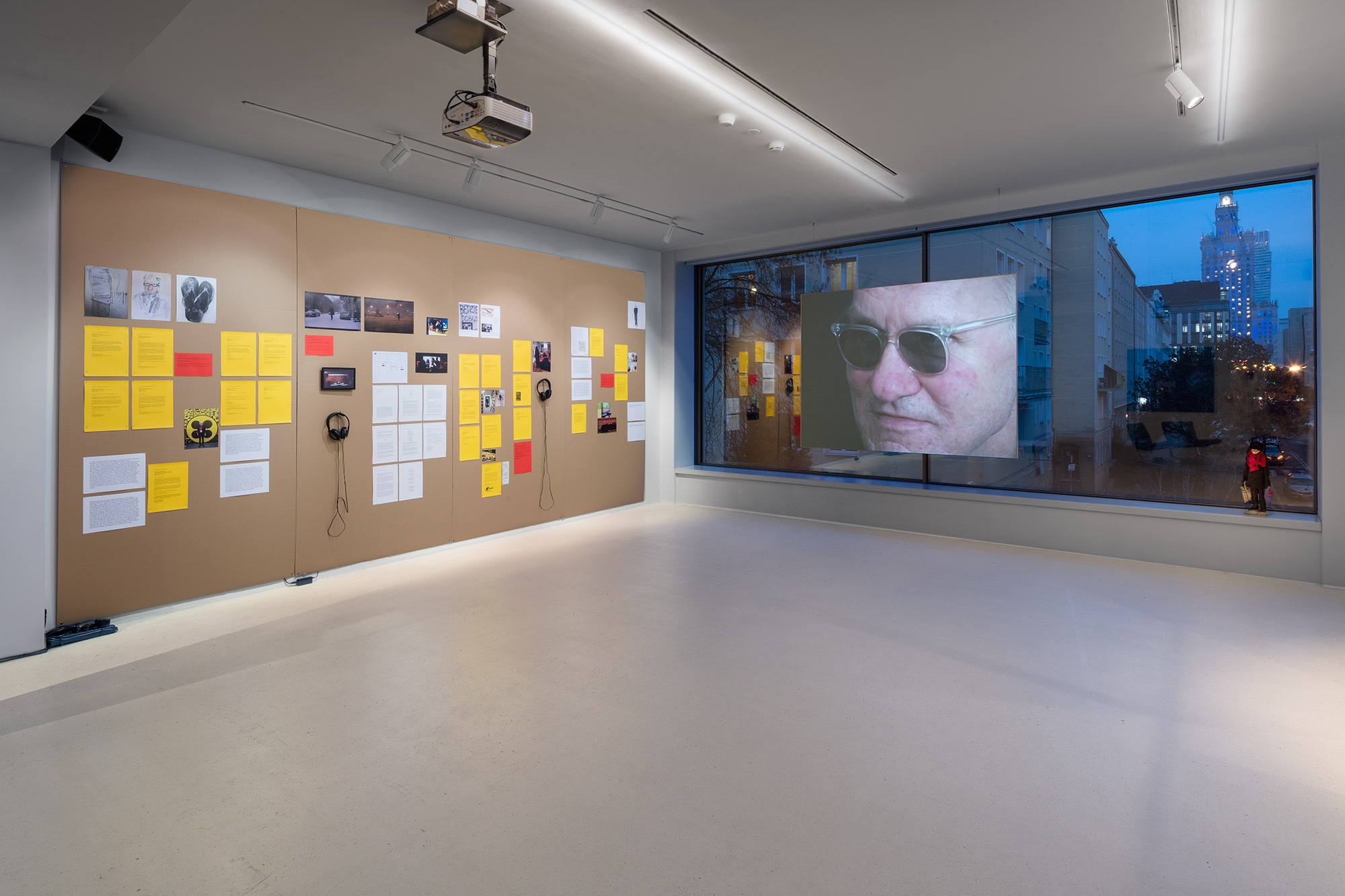
‘And Warren Niesłuchowski Was There: Guest, Host, Ghost’, exhibition view at Foksal Gallery Foundation, 4.12.2020-16.01.2021 Warsaw
Warren Niesluchowski
Ars Gratis Artis: Leading by Charisma
I was swept up into PS1 by a series of improbable encounters, at a time that saw so many borders become frontiers. In Fall 199o, via a series of Ovidian adventures, I found myself in Łódź, where Alanna Heiss was attending the post-Solidarity iteration of the citywide exhibition Construction in Process, and bringing back its organizer, Ryszard Waśko, to be her program director. Though I was there only through my chance acquaintance with Maria Waśko, I was soon introduced to almost everyone, and Candide-like, I agreed to translate in a few crisis meetings. We all stayed in touch, and the following year, Alanna asked me to join PS1 as assistant to the director, though she probably did not realize she was getting a sorcerer’s apprentice and not Dr. Pangloss. My modest contribution was to be a quick study at her side, helping deal with the flow at work and during the many off-hours one spent keeping up one’s relations and presence in what was becoming a hyper-inflationary (in the cosmological sense) universe: the art whirl’d.
As with any self-respecting growing institution, Alanna had ambitions in equal measure to her achievements. Though the former are by nature shrouded in subjectivity, she was lucidly objective about the latter: “I’m an absolute genius but only in one thing: real estate.” Not just the genius loci of the unreal estate that PS1 was fated to be, she attended both to the larger institutional hierarchies in which it was embedded and to the “lower archies” of the art community she presented and, in an unpolitisch sense, represented. As a student of classical and nineteenth-century social theory, I was keenly aware of the significance of leadership by charisma, as opposed to tradition or law. This of course raises the stakes considerably, as in addition to being a showman, one must assume something of the shaman. She was surrounded by a wealth of eminences, all mutually loyal, whom she called on in her drive to renew and regrow what went from a series of off-sites through the Institute for Art and Urban Resources to the institution we know today. (Think Athens to Alexandria to Rome.) Her reputation as an “art radical” evoked something between the “co-temporary” Transcendentalism of Emerson’s Self-Reliance and the softer slopes of his interlocutor Nietzsche’s Dionysianism. When the genius is gone, the ingenious get going. (For me the artistic genius loci-in-residence was Vito Acconci, David Hammons another, more mobile genie. And, not unrelated, it was also becoming clear how much women were becoming the dynamos and unacknowledged transformers of that culture. Ritually mouthing the critical and curatorial pieties that are now commonplace may not have gotten us as far.)
On the blessed isles of the Manhattoes, as on Prospero’s isle in the Tempest, even with a book of magic the cost of displacement and dénouement, however glorious, is always high. And her community, already international, was just beginning to morph into a much vaster generational and geographical archipelago, that hyper-expanse still accelerating as I write. This seems theoretically and practically somewhat unsustainable, but the prospect of our demise-en-scène is even more difficult to imagine.
These are tales to be told by another traveler. But in nova fert animus mutatas dicere formas corpora: you don’t need much Latin, or a theory of poetics, to get the metamorphoses of a classic.
Originally published in MoMA PS1: A History, ed. Bettina Funcke (MoMA Publications, 2019).
***
Both text were published in the book And Warren Niesłuchowski Was There. Ontological Nomad, Guest, Host, Ghost, edited by Sina Najafi and Joanna Warsza, co-published by Cabinet Books and Museum of Modern Art in Warsaw. Book accompanied the exhibition And Warren Niesłuchowski Was There at Foksal Gallery Foundation, Warsaw, 4 December 2020 – 16 January 2021.

Imprint
| Author | Joanna Warsza and Sina Najafi (editors) |
| Title | And Warren Niesłuchowski Was There. Ontological nomad, guest, host, ghost |
| Publisher | Cabinet Books, Museum of Modern Art in Warsaw |
| Published | 2020, New York and Warsaw |
| Index | Artur Żmijewski Barry Schwabsky Cabinet Books Foksal Gallery Foundation Joanna Warsza Museum of Modern Art in Warsaw Paweł Althamer Sina Najafi Warren Niesłuchowski |
